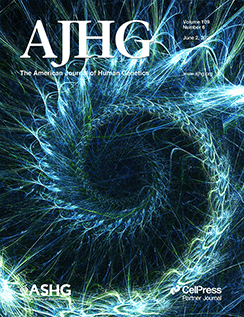在多样化全基因组测序研究中预测同质祖先群体以评估哈代-温伯格平衡的半监督机器学习方法。
IF 8.1
1区 生物学
Q1 GENETICS & HEREDITY
引用次数: 0
摘要
大规模、多种族的全基因组测序(WGS)研究,如美国国家人类基因组研究所基因组测序计划的常见疾病基因组学中心(CCDG),在增加基因研究的多样性方面发挥着重要作用。在进行关联分析之前,评估哈代-温伯格平衡(HWE)是质量控制程序中的关键步骤,可去除低质量变异,确保下游分析的有效性。各种 WGS 研究都包含祖先异质性样本;然而,常用的 HWE 方法假定样本是同质的。因此,将这些方法直接应用于整个数据集可能会产生统计学上无效的结果。为了考虑这种异质性,可以在具有同质祖先基因的样本子集上测试 HWE,并将结果汇总到每个变异上。为了促进有效的 HWE 子集测试,我们开发了一种半监督学习方法,可根据基因型预测同源祖先。这种方法为在不同的 WGS 研究中,在存在种群结构和缺失自我报告的种族和民族的情况下估计 HWE 提供了方便的工具。此外,在同源祖先中评估 HWE 可提供可靠的 HWE 估计值,这将直接有利于下游分析,包括 WGS 研究中的关联分析。我们在 CCDG 数据集上应用了我们提出的方法,预测了 60,545 个多种族 WGS 样本的同源遗传祖先群体,以评估每个群体内的 HWE。本文章由计算机程序翻译,如有差异,请以英文原文为准。
Semi-supervised machine learning method for predicting homogeneous ancestry groups to assess Hardy-Weinberg equilibrium in diverse whole-genome sequencing studies.
Large-scale, multi-ethnic whole-genome sequencing (WGS) studies, such as the National Human Genome Research Institute Genome Sequencing Program's Centers for Common Disease Genomics (CCDG), play an important role in increasing diversity for genetic research. Before performing association analyses, assessing Hardy-Weinberg equilibrium (HWE) is a crucial step in quality control procedures to remove low quality variants and ensure valid downstream analyses. Diverse WGS studies contain ancestrally heterogeneous samples; however, commonly used HWE methods assume that the samples are homogeneous. Therefore, directly applying these to the whole dataset can yield statistically invalid results. To account for this heterogeneity, HWE can be tested on subsets of samples that have genetically homogeneous ancestries and the results aggregated at each variant. To facilitate valid HWE subset testing, we developed a semi-supervised learning approach that predicts homogeneous ancestries based on the genotype. This method provides a convenient tool for estimating HWE in the presence of population structure and missing self-reported race and ethnicities in diverse WGS studies. In addition, assessing HWE within the homogeneous ancestries provides reliable HWE estimates that will directly benefit downstream analyses, including association analyses in WGS studies. We applied our proposed method on the CCDG dataset, predicting homogeneous genetic ancestry groups for 60,545 multi-ethnic WGS samples to assess HWE within each group.
求助全文
通过发布文献求助,成功后即可免费获取论文全文。
去求助
来源期刊
CiteScore
14.70
自引率
4.10%
发文量
185
审稿时长
1 months
期刊介绍:
The American Journal of Human Genetics (AJHG) is a monthly journal published by Cell Press, chosen by The American Society of Human Genetics (ASHG) as its premier publication starting from January 2008. AJHG represents Cell Press's first society-owned journal, and both ASHG and Cell Press anticipate significant synergies between AJHG content and that of other Cell Press titles.

 求助内容:
求助内容: 应助结果提醒方式:
应助结果提醒方式:


